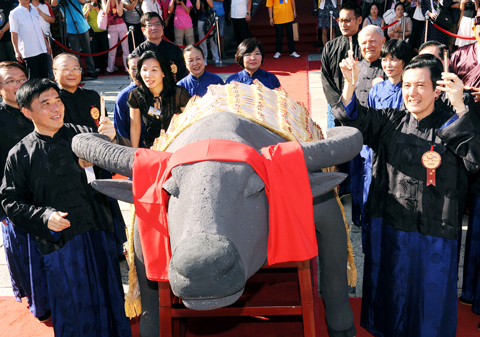Hundreds of local and foreign visitors crowded the Taipei Confucius Temple early yesterday morning to watch the traditional bayi (八佾) dance and eat wisdom cakes in celebration of Confucius’ (孔子) 2,560th birthday.
The dance, a ritual performed to pay respect to emperors, was performed by 64 students and was only the second such performance in Taiwan in 12 years.
The temple sparked controversy when it performed the ritual two years ago to welcome President Ma Ying-jeou’s (馬英九) attendance at the ceremony, attracting criticism from opposition parties that the temple was “worshiping Emperor Ma” with the dance.

PHOTO: CHANG CHIA-MING, TAIPEI TIMES
Ma attended the ceremony again yesterday to pay his respects to the philosopher by burning incense and watching the bayi dance. The temple also opened the Lingxing Gate, the main entrance of the temple that is usually closed during the ceremony, and arranged for the president to enter the temple via the route traditionally taken by emperors.
Shih Su-li (施淑梨), the temple’s secretary, declined to confirm whether the temple performed the dance and opened the main entrance specifically for the president and insisted that all rituals and arrangements followed ancient traditions.
The temple usually performs the liuyi (六佾), a ritual performed to pay respects to feudal barons, to celebrate Confucius’ birthday.
Addressing the ceremony after the two-hour ritual, Ma cited the Analects to emphasize the importance of politicians taking a righteous path and said he chose to attend the ceremony to promote Confucianism.
“I have attended this ceremony twice because I think Confucianism and the rituals should be part of our lives ... Confucius taught us that a politician must take the righteous path, and if you take that path, your subordinates would not dare to take an evil path,” he said.
Ma is the first president to participate in the ceremony at the temple. Former president Chiang Kai-shek (蔣介石) visited the temple one day before the ceremony in 1968, Shih said.
The ceremony was presided over by Taipei Mayor Hau Lung-bin (郝龍斌).
The temple is one of the few Confucius temples that still performs ancient rites that strictly follow the ancient rules with 37 steps in the ceremony sequence.
After the performance of the ritual, some visitors rushed to the center plaza of the temple to “pull” writing brushes from an artificial cow’s back as part of the “pulling of wisdom hair” ritual, creating a chaotic scene when some ran into each other and fell down.
Shih said the temple had 2,000 brushes at the ceremony, and it did not expect to have so many people participate in the activity.

Taipei, New Taipei City, Keelung and Taoyuan would issue a decision at 8pm on whether to cancel work and school tomorrow due to forecasted heavy rain, Keelung Mayor Hsieh Kuo-liang (謝國樑) said today. Hsieh told reporters that absent some pressing reason, the four northern cities would announce the decision jointly at 8pm. Keelung is expected to receive between 300mm and 490mm of rain in the period from 2pm today through 2pm tomorrow, Central Weather Administration data showed. Keelung City Government regulations stipulate that school and work can be canceled if rain totals in mountainous or low-elevation areas are forecast to exceed 350mm in

EVA Airways president Sun Chia-ming (孫嘉明) and other senior executives yesterday bowed in apology over the death of a flight attendant, saying the company has begun improving its health-reporting, review and work coordination mechanisms. “We promise to handle this matter with the utmost responsibility to ensure safer and healthier working conditions for all EVA Air employees,” Sun said. The flight attendant, a woman surnamed Sun (孫), died on Friday last week of undisclosed causes shortly after returning from a work assignment in Milan, Italy, the airline said. Chinese-language media reported that the woman fell ill working on a Taipei-to-Milan flight on Sept. 22

COUNTERMEASURE: Taiwan was to implement controls for 47 tech products bound for South Africa after the latter downgraded and renamed Taipei’s ‘de facto’ offices The Ministry of Foreign Affairs is still reviewing a new agreement proposed by the South African government last month to regulate the status of reciprocal representative offices, Minister of Foreign Affairs Lin Chia-lung (林佳龍) said yesterday. Asked about the latest developments in a year-long controversy over Taiwan’s de facto representative office in South Africa, Lin during a legislative session said that the ministry was consulting with legal experts on the proposed new agreement. While the new proposal offers Taiwan greater flexibility, the ministry does not find it acceptable, Lin said without elaborating. The ministry is still open to resuming retaliatory measures against South

1.4nm WAFERS: While TSMC is gearing up to expand its overseas production, it would also continue to invest in Taiwan, company chairman and CEO C.C. Wei said Taiwan Semiconductor Manufacturing Co (TSMC) has applied for permission to construct a new plant in the Central Taiwan Science Park (中部科學園區), which it would use for the production of new high-speed wafers, the National Science and Technology Council said yesterday. The council, which supervises three major science parks in Taiwan, confirmed that the Central Taiwan Science Park Bureau had received an application on Friday from TSMC, the world’s largest contract chipmaker, to commence work on the new A14 fab. A14 technology, a 1.4 nanometer (nm) process, is designed to drive artificial intelligence transformation by enabling faster computing and greater power